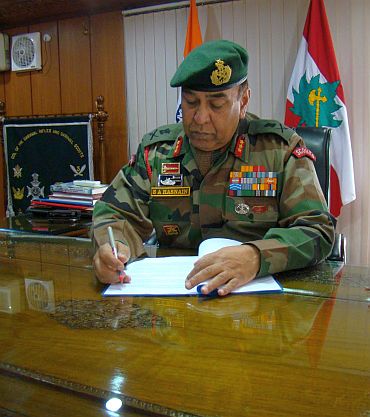
A general battling an insurgency among an often hostile populace while labouring hard and openly to win hearts and minds is not usual, but that is what Lt Gen Syed Ata Hasnain, commander of the Srinagar-based 15 Corps, has been at since taking charge four months earlier.
Ajai Shukla spoke to him. Excerpts:
I am sure you have been asked this before, but how does your Muslim identity help you in dealing with the Kashmiri people?
Well, people read my name and it helps in the first meeting, but Kashmiris are very analytical.
Unless they believe I'm genuinely helping them, I won't get a second chance. More than from my faith, I benefit from long experience in Kashmir, where I commanded a brigade and then a division before coming to 15 Corps.
I also benefit from my understanding of religion as a strategic weapon. And, I greatly benefit from my relationships with many people who I have known from past tenures, both civilians and in the administration.
...
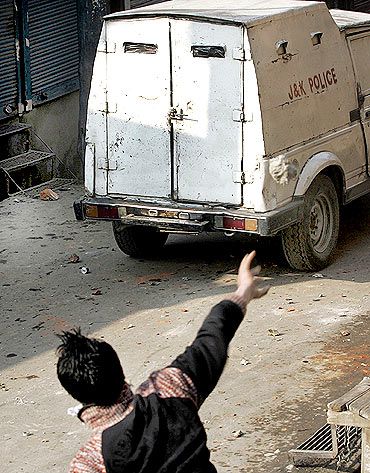
How significant is your success in bringing down militancy? The army says there are just 300 militants left in the valley?
I'm not looking just at statistics. To say that militancy is down to sub-critical levels and this year we'll be able to stop it completely, it is not like that. I always caution people, don't get elated by numbers.
The problem remains one of intent and infrastructure across the Line of Control, where 700-800 terrorists are ready for infiltration and many more are being trained.
The big problem in the Valley now seems to be stone pelting and mass uprising, not militancy. Is the army shifting focus?
I see a clear nexus between stone pelting and terrorism. From 2008, when the agitation started, the main instigators and crowd controllers were all known militants.
And, the stone pelters were doing it for money. Near Zainakote is a boatmen's colony, all poor people. They were paid Rs 300 per day to throw stones.
In Baramulla, where the cart pushers earn Rs 200 per day, they were willing to throw stones for Rs 300.
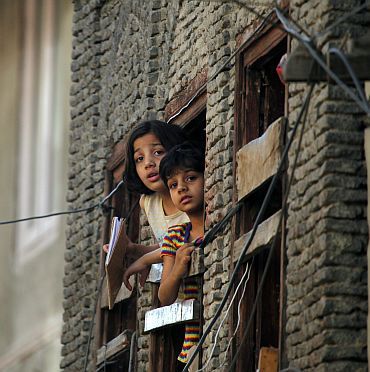
Is this going to be a summer of discontent again?
After three summers of agitation, most Kashmiris have lost patience. Parents don't want school-going children to take to the streets. Businessmen, shopkeepers, labourers, white collar workers, all want normalcy. Important organisations like, for example, the Tata Sumo Union, are putting pressure for normalcy.
But the separatist leadership is looking for a trigger they can use to start an agitation. Over the past three years, we gave it to them on a platter.
In 2008, the trigger was the Amarnath Shrine land issue, with all its misinformation. In 2009, you had the mysterious deaths of two girls in Shopian; again, nothing was proved. Last year, it was the unfortunate death of a young boy, Tufail Mattoo, killed by a teargas canister.
And, there could be another trigger this year?
An innocuous incident could be exploited tomorrow, for example a traffic accident involving an army vehicle. If a trigger is there, things could snowball.
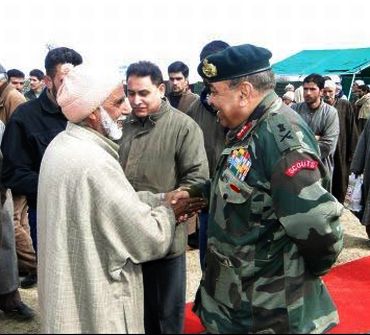
Many Kashmiri villagers are impressed with your programme to win hearts and minds.
Our senior officers always knew that soft power makes the ultimate difference in an insurgency. But the junior ranks were more focused on operations, understandably, given the high levels of insecurity. Now, they are focusing on being courteous and helpful, for instance, when checking a vehicle.
So, our people-friendly approach is being implemented from top to bottom. Training soldiers for this is more difficult than training them in tactical drills, but now the young officers and soldiers have taken ownership of this initiative.
For over a decade, we have run a programme called Sadbhavana, providing material benefits like schools and vocational training to the populace. Now we are engaging them at the human level. The basis of my strategy has been to listen, rather than to talk down to the people
You believe it is working?
Our new approach has certainly created interest. We are engaging the youth, getting them off the streets through focused programmes like explaining the opportunities for them in other parts of the country. In a programme called 'Watan ki sair', we sponsor trips by youngsters across India.
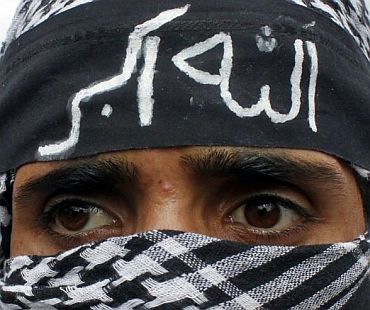
Nevertheless, there remains real anger amongst Kashmir's youth.
If you're living in a tinderbox, where the press is negative, and you can't move around, there will be anger against everything.
Most places offer ways of diverting oneself; here there is nothing, especially during the five-month winter, when everyone stays at home. We have begun organising events and competitions in football, cricket, carom, debates and quizes. We recently organised a half-marathon, and 3,000 people participated, including 300 girls. Another 8,000 people came out to cheer the runners.
What about the political dialogue?
There are too many players who don't want normalcy, Pakistan's ISI for example. Separatists will only negotiate if there is pressure from the people of Kashmir, who must be convinced they are better off with India.
For that, the Army has to prevent turbulence, so that the other government agencies can work towards creating normalcy.
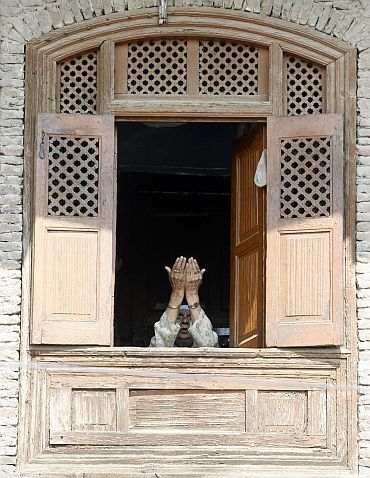
And, the confidence building mechanisms, like the Srinagar-Muzaffarabad transport links, are losing steam?
I was at Uri when the Caravan-e-Aman (the Srinagar-Muzaffarabad bus) began with much fanfare. Now, barely anyone travels on the bus.
Trade is increasing, but without a strong regulatory body that deals with communications, financial exchanges, etc, it cannot pick up. All that can happen only with improvement in relations. So, it is a Catch-22 situation.
This January, I found 120 trucks coming and going from each side. But everyone has hijacked the rules, so you even find coconuts from Kerala going across, even though trade has to be confined to local produce.
Your final assessment?
I believe 2011 is a crucial year. The stamina for mass agitation is running low, terrorism is down, and infiltration is low. 2011 must be the year of difference in Kashmir.